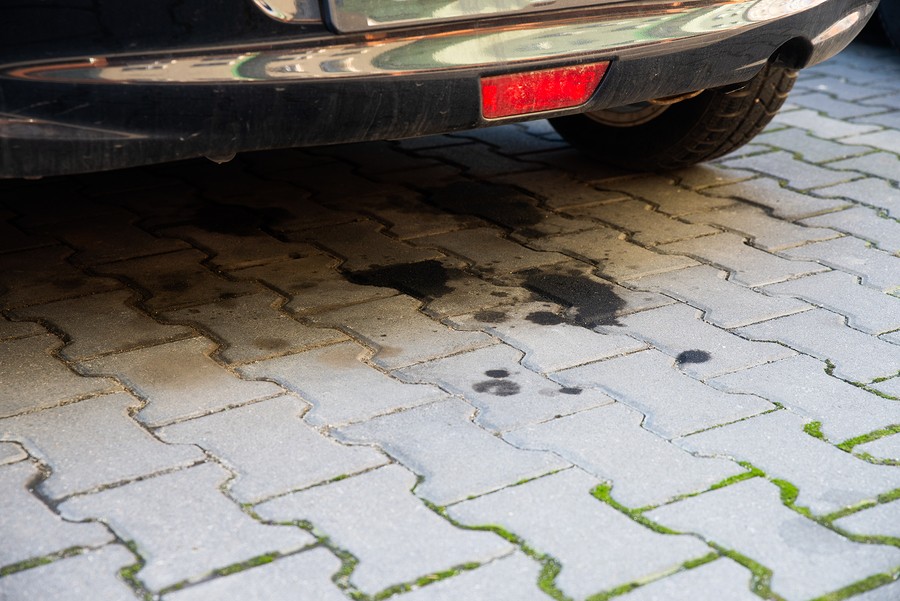You’ve just finished picking up some hand-sanitizer and tissues from the grocery store and are about to drive away. When suddenly, someone waves you down, gesturing towards your vehicle. “Excuse me, sorry to bother you, but I noticed your car has a puddle of dark liquid under it.” Thanks, kind stranger! Hmm, perhaps that’s why the dashboard oil light came on a week ago? It sounds like you may have an oil leak. You might be wondering how to tell if your car is leaking oil, let’s review.
The most obvious sign is a puddle of brown or yellow liquid under your car. You may also notice smoke coming from under the hood, or the smell of burnt oil. Which usually coincides with a dashboard oil light or a temperature gauge creeping into the red.
Don’t worry, the world’s not coming to an end (even though it might feel like it). Let’s take a closer look at what it means when your car is leaking oil. We’ll also review the most common signs of an oil leak, and what causes one. Lastly, we’ll examine how to help stop or prevent an oil leak, as well as what you can expect in terms of costs for repairs.
What Does it Mean When Your Car Leaks Oil?
Your engine uses oil to stay lubricated, ensuring the movement of its internal parts creates as little friction as possible. Too much, and you’ll have issues with overheating, which can lead to costly repairs if left unchecked. When your car is leaking oil when parked, a few things happen. The first is that it doesn’t get the amount of lubrication it needs while running, which leads to more friction. The second is that to make up for the first, internal parts have to work harder, which can lead to them failing.
For this reason, you should always address an oil leak at the first signs of an issue. Let’s look at the most common symptoms of oil leaking from a car.
How to Tell if Your Car is Leaking Oil
- Visible Puddles Under Your Car
The first, and the most obvious sign that your car is leaking oil, is visible puddles of dark greasy liquid under it. If it’s dark brown or yellow, it’s oil, if it’s pink, it’s transmission fluid, and if it’s orange or green, it’s coolant. The main thing to watch is the level, which, if your car is leaking a lot of oil, is cause for alarm.
Does a little bit of oil mean I should be worried? No, a few drips every now and then are perfectly normal. If your car is leaking oil fast, you should notice large puddles, as well as a dropping level.
- Smoke Coming from the Engine/Burnt Oil Smell
The only smoke that should come from your car is exhaust fumes, and they should only come out of the tailpipe. If there’s an internal oil leak, there’s a good chance some of it drips on the exhaust manifold. This will result in several things, the first being smoke coming from under the hood. The second is a sizzling sound, as well as an unpleasant bitter smell, which is the oil burning.
If your car is leaking oil and smoking, it’s likely due to this. Which you should handle as soon as possible, or you’ll risk damaging the oxygen sensors and gaskets.
- Dashboard Oil Light
What more could you ask for than an indicator light that illuminates when there’s a drop in oil pressure? The dashboard oil light does precisely that. You should always take this light seriously. Otherwise, the worst-case scenario is a seized engine due to a lack of lubrication.
A drop in oil pressure doesn’t always mean a leak is present. It could just imply it’s due for an oil change. It could also mean a faulty part, such as an oil pump or oil sensor. If the oil indicator light comes on while driving, your best bet is to pull over and check the oil level using the dipstick.
- Engine Overheating
Having enough oil – is crucial when it comes to your engine staying within a safe temperature range. As we mentioned earlier, oil keeps heat low by reducing friction. Allowing the pistons to power the car without getting too hot. If it does overheat, there’s a good chance it seizes. Which usually means the end of your motor (without extensive repairs).
If there’s an oil leak and the level drops low enough, the chances of it overheating increase dramatically. If you notice the heat gauge creeping into the red zone. You may want to think about checking the oil level.
Now that we’ve covered how to tell if there’s oil leaking from a car. Let’s look at a few of the most common causes of an oil leak.
Common Causes of a Car Leaking Oil

- Bad Oil Filter
Oil filters are in charge of removing contaminants from your oil before they can cause harm to your engine. Most last for about 3-months or 3,000 miles, at which time you should replace it for a fresh one. If you ignore a worn oil filter, it’s not able to do the job it was intended for, which can lead to an oil leak.
Your engine creates a lot of pressure, which can cause the oil filter to become loose and misaligned. In which case, it needs to be corrected or replaced.
- Loose/Broken Filler Cap
Not all causes of an oil leaking car are significant, it might be as simple as a loose or broken oil filler cap. If so, oil can leak out, and continue to leak even after you’ve parked. If you’re asking yourself: “why is my car leaking oil?” The good news is that by checking your oil level, you should be able to notice if there’s a problem with the filler cap.
- Worn Drain Plug
If your car is leaking oil after an oil change, there’s a good chance it’s due to a worn or misaligned drain plug. The oil drain plug is located at the bottom of your oil pan, and as its name suggests, is how your car gets drained of oil. If it’s worn or screwed on incorrectly after an oil change, it may drip. It can also become damaged due to running something over.
- Oil Pan Damage
If there’s oil leaking from the bottom of your car, it might be from damage to the oil pan. It’s usually comprised of thin steel and bolted to the bottom of the crankcase with a gasket in-between. It serves as a reservoir for oil while the engines off. There doesn’t have to a hole in your oil pan for it to leak oil. The gasket can become loose or damaged from hitting debris, leading to oil leaking under the car.
- Degraded Gasket
Here’s the most common cause of oil leaks, degraded gaskets. Gaskets connect different metal parts. Creating a seal that allows the transfer of fluids, without them leaking where they don’t belong.
Over time gaskets will degrade, causing the seals to weaken. There’s no set amount of time you can expect out of one, but usually, you shouldn’t run into any issues before 100,000 miles. If it’s determined that there’s damage to any of your gaskets, you should handle them right away. If not, you risk costly repairs like a cracked engine block, which will only make matters worse.
Check out our previous article for more information on what to do if you have a blown head gasket.
- Cracked Engine Block
If you notice a massive amount of oil leaking from the front of your car, it might be from a cracked engine block. Yes, we said it, the dreaded phrase that signals a costly repair (if a repair is possible at all). An engine block is a single mass of metal, and if it cracks, the repairs to correct it can be significant. Oil can leak through a crack internally and end up where it doesn’t belong. Or it can leak externally, which you’ll quickly notice.
Check out our previous article for more information on what to do if you have a cracked engine block.
Now that we’ve reviewed some of the most common causes of oil leaks. Let’s look at the options you have to help stop or prevent them.
How to Stop/Prevent Oil Leaking from a Car
- Frequency of Oil Changes
If you look back at a few of the causes of oil leaks, then changing your frequently can really be beneficial in catching them early. First, there’s the oil filter, which can cause a leak if it’s worn or misaligned. Then, there’s your oil pan, filler cap, and drain plug. Which if you’re changing your oil often enough, you should notice problems with before they become worse.
The best suggestion for frequency is to follow the recommended service schedule set by the manufacturer. Most newer vehicles are suited for as high as 10,000 miles, but a lot of that depends on the shape of the roads you frequent. Be sure to consult your owners-manual or call a certified shop to be sure.
- Type of Oil
Many newer oils contain additives that can help stop or prevent leaks from happening due to worn gaskets. They’re called seal conditioners. And they cause degraded gaskets to swell, which tightens the seal and makes them more flexible. As mentioned with your suggested service schedule. Be sure to inspect your manual when searching for the right type of oil for your model.
- Leak Stopping Additives
If you don’t currently have oil with leak stopping properties, you can always buy an additive. They soften and condition seals, causing them to swell, which may help stop small leaks. However, it’s not a permanent solution, and they’re not useful for more significant leaks. Your best bet is to tackle the issue head-on by taking your car to a shop to diagnose the cause and get it taken care of.
Now that we’ve covered a few things you can do to help prevent leaks. Let’s look at what you can expect to pay to resolve an oil leak.
How Much Will Repairs Cost if My Car is Leaking Oil?
Something like an oil filter, broken filler cap, or damaged drain plug are trivial and shouldn’t cost much more than $100 at your local auto parts store. Beyond that, it gets more costly. For a damaged oil pan, costs can reach as much as $1,000, including parts and labor. For a degraded gasket, it depends on which seal it is. If it’s a blown head gasket, many hours or days are needed to replace it, yielding a cost of up to $2,000.
And then there’s a cracked engine block, which is the one thing nobody wants to hear. To repair a cracked engine block (if one is possible). The average cost is roughly $2,500 to $3,000. If a fix is deemed impossible, the only option is to replace the engine. For a regular motor, this can mean about a $4,000 to $5,000 repair bill. For a luxury or performance engine – as much as $10,000.
The best way to keep costs low? Take care of an oil leak at the first signs of an issue.
Is a Car Leaking Oil Safe to Drive?

You can only hope for the best until it becomes the worst. Is it safe to drive a car that’s leaking oil? You can never be sure until you diagnose the cause. In terms of cost, continuing to drive a vehicle that’s leaking oil is a surefire way to make matters worse. The worst-case scenario? A blown head gasket or cracked engine block. Not to mention the possibility of getting stranded on the side of the road in need of a tow truck.
Why even take the risk? Instead, if you notice a puddle of dark liquid under your car, a dashboard oil light, or engine overheating – check your oil level. If it’s low, add some, if it continues to drip, take it to a professional.




